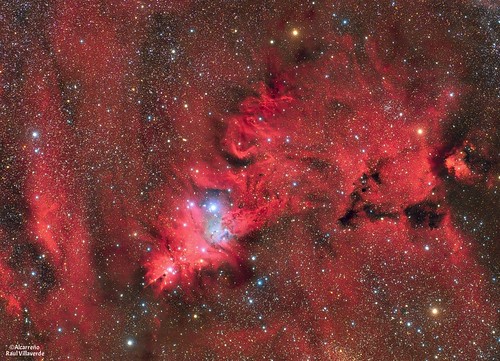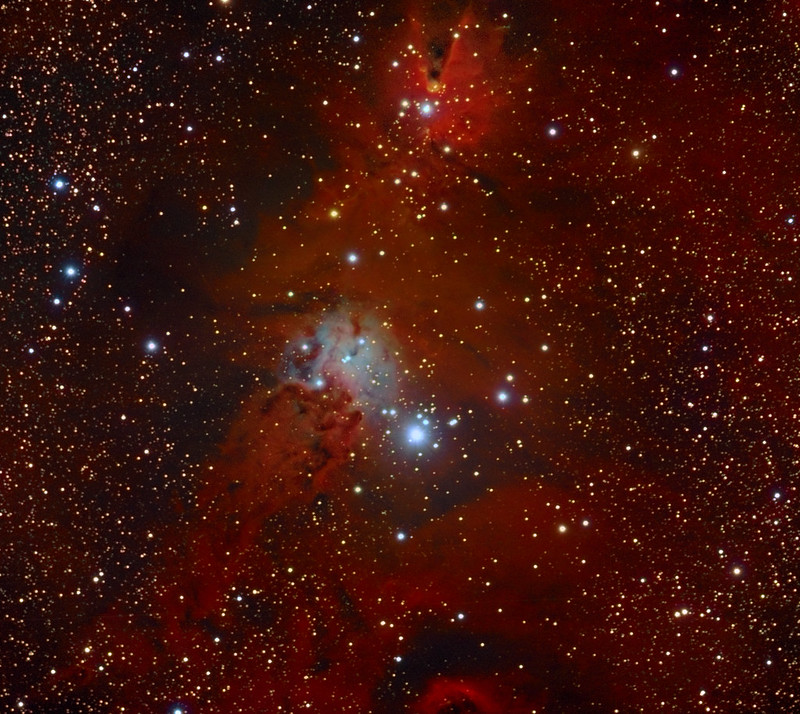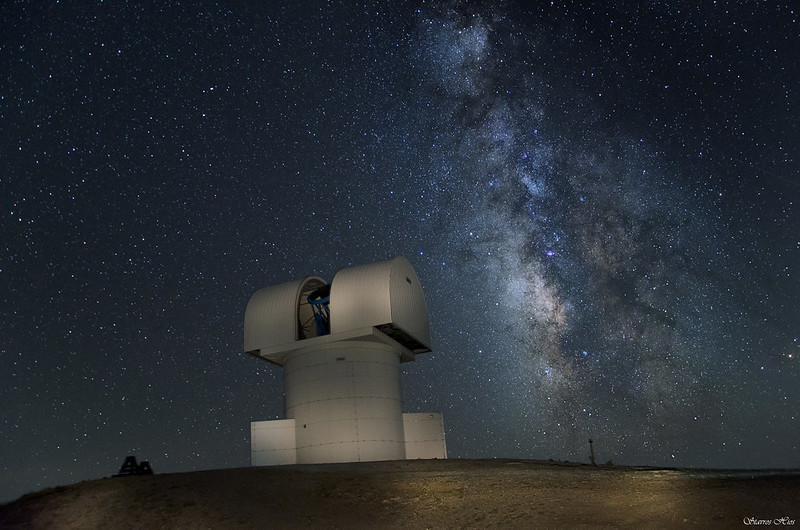Submissions: 2016 January
Witch Head Nebula
Witch Head Nebula Data: R. De Benedictis Processing: P.Pinciaroli
3 hours with DSRL
copyright: De Benedictis-Pinciaroli
e-mail: paolo.pinciaroli@tiscali.it
Blog: http://the-boot-blog.blogspot.it/
LBN 777
Baby Eagle Nebula, finally gahtered enough data to put together this LRGB image .A few degrees from M45, a tough ,extremely feint dark reflection nebula .
total image time 19 hrs, with 13 hours Luminanace , and 2 hours each Red, Green and Blue
For larger high res image follow link below
http://shaunreynoldsastro.com/p18930873 ... #h6239a170
total image time 19 hrs, with 13 hours Luminanace , and 2 hours each Red, Green and Blue
For larger high res image follow link below
http://shaunreynoldsastro.com/p18930873 ... #h6239a170
Re: Submissions: 2016 January
Aurora, galaxies, meteors and satellites
Composite of 4 x 30s images taken from Bruny Island, Tasmania, Australia on 8th January 2016. Base image of aurora and sky is a single image - composite adds brightest meteors only. Aurora colors not visible to naked eye, although the region closest to horizon appeared similar to twilight. Aurora Kp ~2.7.
Copyright: Steve Johnston
Copyright: Steve Johnston
Last edited by SteveJ on Mon Jan 18, 2016 5:50 am, edited 2 times in total.
Comet Catalina meets Galaxies in Ursa Major
Last saturday, from the OAC Observatory located in Northwestern Spain, I used a 200mm lens and a DSLR camera to shot this image, where we can see Galaxy M101, comet Catalina, star Alkaid and Galaxies M51 (from left-down corner to right-upper corner). A must see which I could not miss despite the strong wind (I had to discard many other shots, namely those taken with a 1000mm Newton telescope).
Re: Submissions: 2016 January
Hello!
This is my version of the Tarantula Nebula
GSO 12" F/5
Canon T1i Modded
66x120"
Presidente Lucena - Brazil
Eimer Sternen Observatory
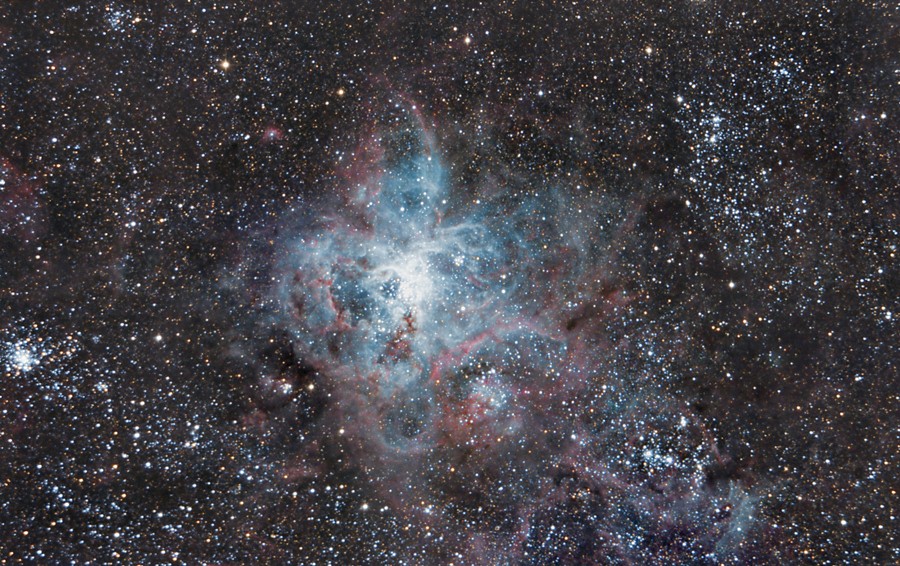 tarantula_66x120_DBE_9 pq by Rafael Compassi, no Flickr
tarantula_66x120_DBE_9 pq by Rafael Compassi, no Flickr
This is my version of the Tarantula Nebula
GSO 12" F/5
Canon T1i Modded
66x120"
Presidente Lucena - Brazil
Eimer Sternen Observatory
 tarantula_66x120_DBE_9 pq by Rafael Compassi, no Flickr
tarantula_66x120_DBE_9 pq by Rafael Compassi, no FlickrRe: Comet Catalina meets Galaxies in Ursa Major
This is a wonderful shot, with Comet Catalina next to one of my favorite blue stars, Alkaid, and stunning spiral galaxies flanking the pair in opposite corners!angelaros wrote:Last saturday, from the OAC Observatory located in Northwestern Spain, I used a 200mm lens and a DSLR camera to shot this image, where we can see Galaxy M101, comet Catalina, star Alkaid and Galaxies M51 (from left-down corner to right-upper corner). A must see which I could not miss despite the strong wind (I had to discard many other shots, namely those taken with a 1000mm Newton telescope).
Ann
Color Commentator
C/2013 US 10 Catalina passing by M 101

The day, when Catalina was the brightest. Picture taken through the night 16/17 of January, comet at the position 1:10 CET.
Two panel mosaic. Technical details at Astrobin.
Direct link do hires picture : http://cdn.astrobin.com/images/thumbs/b ... ermark.jpg
- astrochuck
- Ensign
- Posts: 45
- Joined: Thu Jun 28, 2012 8:48 pm
- AKA: Chuck Manges
- Contact:
Re: Submissions: 2016 January
Red Sprites at Paranal Observatory
Copyright: Petr Horálek (http://www.astronom.cz/horalek/?page_id=20) / ESO (http://www.eso.org)
Amazing image of sprites at Paranal Observatory, captured from the VLT platform on 27 January 2015. First imaged in 1989, red sprites are a ghostly phenomenon that occur at high altitudes above thunderstorms. Photographed here by ESO Photo Ambassador Petr Horálek, the unmistakable tendrils of multiple red sprites are spotted approximately 600 kilometres away from ESO's Paranal Observatory above distant thunderclouds. To capture multiple sprites in one image, two exposures were combined. The upper sprite occurred nearly 21 minutes before the lower one. In the foreground sits a lone 1.8-metre Auxiliary Telescope, part of ESO's Very Large Telescope (VLT). More and the image in full resolution can be found here: http://www.eso.org/public/images/150127paranal2345_rs/.
Sprites are extremely rare atmosphere phemomena caused by irregularities in the ionosphere, high above storm clouds, at altitudes of about 80 kilometres. Typically seen as groups of red-orange flashes, they are triggered by positive cloud-to-ground lightning, which is rarer and more powerful than its negative counterpart, as the lightning discharge originates from the upper regions of the cloud, further from the ground. In a short burst, the sprite extends rapidly downwards, creating dangling red tendrils before disappearing. The sprite pictured here was most likely over 500 kilometres away (compare with a satellite image showing the storm over Argentina), spanned a height of up to 80 kilometres and lasted only a fraction of a second. More and the image in full resolution can be found here: http://www.eso.org/public/images/potw1505c/.
Copyright: Petr Horálek (http://www.astronom.cz/horalek/?page_id=20) / ESO (http://www.eso.org)
Amazing image of sprites at Paranal Observatory, captured from the VLT platform on 27 January 2015. First imaged in 1989, red sprites are a ghostly phenomenon that occur at high altitudes above thunderstorms. Photographed here by ESO Photo Ambassador Petr Horálek, the unmistakable tendrils of multiple red sprites are spotted approximately 600 kilometres away from ESO's Paranal Observatory above distant thunderclouds. To capture multiple sprites in one image, two exposures were combined. The upper sprite occurred nearly 21 minutes before the lower one. In the foreground sits a lone 1.8-metre Auxiliary Telescope, part of ESO's Very Large Telescope (VLT). More and the image in full resolution can be found here: http://www.eso.org/public/images/150127paranal2345_rs/.
Sprites are extremely rare atmosphere phemomena caused by irregularities in the ionosphere, high above storm clouds, at altitudes of about 80 kilometres. Typically seen as groups of red-orange flashes, they are triggered by positive cloud-to-ground lightning, which is rarer and more powerful than its negative counterpart, as the lightning discharge originates from the upper regions of the cloud, further from the ground. In a short burst, the sprite extends rapidly downwards, creating dangling red tendrils before disappearing. The sprite pictured here was most likely over 500 kilometres away (compare with a satellite image showing the storm over Argentina), spanned a height of up to 80 kilometres and lasted only a fraction of a second. More and the image in full resolution can be found here: http://www.eso.org/public/images/potw1505c/.
Last edited by Petr H. on Mon Jan 18, 2016 9:18 pm, edited 1 time in total.
Re: Submissions: 2016 January
Venus and the swimming Moon
Copyright: Petr Horálek (http://www.astronom.cz/horalek/?page_id=20)
A year ago, 21 January 2015, I witnessed very unusual view to the darkening horizon before the first stars appeared above the La Silla observatory. Just a minutes after the sun set over the horizon of distant south Pacific, the crystal purity of the Atacama’s air allowed me to spot the very young Moon. This crescent was followed by bright planet Venus and slowly moved to the horizon too. When it touched the dusty belt of far polluted atmosphere, a rare theater had begun. Moon was literally distorted due to different optical conditions in the thin layer above the horizon and it made a feel like it was swimming there. So yes, the weird „snaky“ shape on the horizon is the Moon… More and the images in higher resolution: http://www.astronom.cz/horalek/?p=2080
Copyright: Petr Horálek (http://www.astronom.cz/horalek/?page_id=20)
A year ago, 21 January 2015, I witnessed very unusual view to the darkening horizon before the first stars appeared above the La Silla observatory. Just a minutes after the sun set over the horizon of distant south Pacific, the crystal purity of the Atacama’s air allowed me to spot the very young Moon. This crescent was followed by bright planet Venus and slowly moved to the horizon too. When it touched the dusty belt of far polluted atmosphere, a rare theater had begun. Moon was literally distorted due to different optical conditions in the thin layer above the horizon and it made a feel like it was swimming there. So yes, the weird „snaky“ shape on the horizon is the Moon… More and the images in higher resolution: http://www.astronom.cz/horalek/?p=2080
Re: Submissions: 2016 January
The fairy tale of Oravska Lesna
Copyright: Petr Horálek (http://www.astronom.cz/horalek/?page_id=20)
Once upon a time, a pilgrim with a machine called camera was walking around the world. He witnessed so many wonderful places, tried so many adventures, met so many different people. But this place was magical, the unforgettable one. When he spotted a beautiful gretel of Oravska Lesna in Slovakia, surrounded by wonderful hills and far mountains of High Fatra and with the sky painted by countless twinkling stars, his curiosity made him just to knock on the doors and recognize the people inside. And he didn’t even dream about what followed. Those people were so kind and such infinite generous, that without any questions they gave him rich dinner, allowed him to oversleep in the warm while freezing outside, and in the very next morning – when his wandering feet wanted to continue – they just wished him good-luck for his further life. He was so grateful to make for them just this night portrait of the wonderful place… Based on true experience More and the image in higher resolution: http://www.astronom.cz/horalek/?p=2101
More and the image in higher resolution: http://www.astronom.cz/horalek/?p=2101
Copyright: Petr Horálek (http://www.astronom.cz/horalek/?page_id=20)
Once upon a time, a pilgrim with a machine called camera was walking around the world. He witnessed so many wonderful places, tried so many adventures, met so many different people. But this place was magical, the unforgettable one. When he spotted a beautiful gretel of Oravska Lesna in Slovakia, surrounded by wonderful hills and far mountains of High Fatra and with the sky painted by countless twinkling stars, his curiosity made him just to knock on the doors and recognize the people inside. And he didn’t even dream about what followed. Those people were so kind and such infinite generous, that without any questions they gave him rich dinner, allowed him to oversleep in the warm while freezing outside, and in the very next morning – when his wandering feet wanted to continue – they just wished him good-luck for his further life. He was so grateful to make for them just this night portrait of the wonderful place… Based on true experience
VDB 9
VDB 109
G. zacchi - P. Pinciaroli
BRC 250, CCD Apogee 6303
L-RGB 460 50 50 50
Copyright: Paolo Pinciaroli
info@paolopinciaroli.com
full: http://the-boot-blog.blogspot.it/
G. zacchi - P. Pinciaroli
BRC 250, CCD Apogee 6303
L-RGB 460 50 50 50
Copyright: Paolo Pinciaroli
info@paolopinciaroli.com
full: http://the-boot-blog.blogspot.it/
-
Brendan Kinch
-
Guest
Re: Submissions: 2016 January
Subject: Sh2-124 (Ha + OIII filters)
Copyrights: James Collins
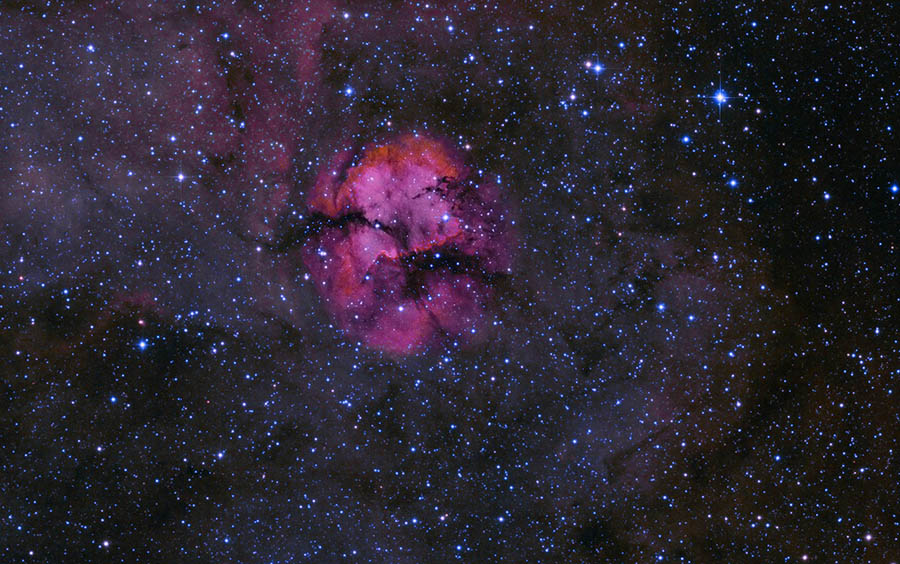
Larger image URL:
http://jimstar11.com/SH2-124m.jpg
Web Site: Meadow View Observatory
http://jimstar11.com/
Copyrights: James Collins

Larger image URL:
http://jimstar11.com/SH2-124m.jpg
Web Site: Meadow View Observatory
http://jimstar11.com/
-
stavroshios
-
stavroshios
-
Efrain Morales
- Commander
- Posts: 508
- Joined: Fri Oct 22, 2010 8:15 pm
- AKA: Jaicoa
- Location: Aguadilla, Puerto Rico
- Contact:
Re: Submissions: 2016 January
"Lunar Occultation of Aldebaran" - January 19, 2016
This video was recorded from Cayce, SC on 1/19/16 at 9:31pm using my 8" Meade LX200 classic and an iPhone 5S. I set up my telescope shortly after sunset and slowly observed the moon moving closer to Aldebaran. As the event time approached, I attached my phone to my eyepiece using an Orion SteadyPix Pro smartphone mount and began recording a couple of minutes before the event. About 45 minutes later Aldebaran emerged from behind the moon. Temperatures were near freezing during the occultation, but I managed to brave the cold and capture a nice recording of the event.
This video was recorded from Cayce, SC on 1/19/16 at 9:31pm using my 8" Meade LX200 classic and an iPhone 5S. I set up my telescope shortly after sunset and slowly observed the moon moving closer to Aldebaran. As the event time approached, I attached my phone to my eyepiece using an Orion SteadyPix Pro smartphone mount and began recording a couple of minutes before the event. About 45 minutes later Aldebaran emerged from behind the moon. Temperatures were near freezing during the occultation, but I managed to brave the cold and capture a nice recording of the event.
Lagoon Nebula
http://2.bp.blogspot.com/-R5ACnMC68RI/V ... _Fin-a.jpg
Lagoon Nebula
Data: De Benedictis Riccardo
Processing: Paolo Pinciaroli
Canon EOS 40d
Takahashi TSA 102
About integration 2 hours
Copyrights: Paolo Pinciaroli
http://the-boot-blog.blogspot.it/
e-mail: paolo.pinciaroli@tiscali.it
Last edited by lebowski on Thu Jan 21, 2016 8:37 am, edited 2 times in total.
Re: Submissions: 2016 January
NGC 7653
https://www.flickr.com/photos/83142843@ ... ateposted/
Copyright: Brandon Pimenta, Hubble Legacy Archive, NASA, ESA
https://www.flickr.com/photos/83142843@ ... ateposted/
Copyright: Brandon Pimenta, Hubble Legacy Archive, NASA, ESA
Re: Submissions: 2016 January
NGC891
Larger image available at:
http://www.astrobin.com/236848/0/
Nick Pavelchak
Altamont, NY
http://www.astrobin.com/users/sydney/
Larger image available at:
http://www.astrobin.com/236848/0/
Nick Pavelchak
Altamont, NY
http://www.astrobin.com/users/sydney/
-
Paul Haese
- Ensign
- Posts: 80
- Joined: Tue Feb 01, 2011 10:38 pm

